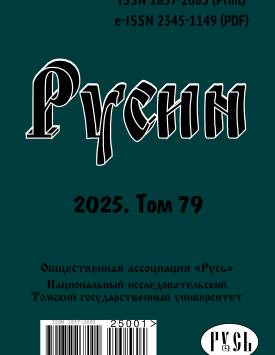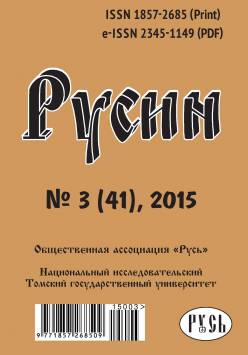Processing of emotional texts in Russian by native Russian speakers and Yakut-Russian bilinguals: An exploratory analysis of experimental data
This paper represents the first stage of an experimental project investigating the cognitive processing of emotionally-valenced textual stimuli in L2 by Turkic-Russian bilinguals with a control group of native Russian speakers. The study employs a specialized experimental design: participants are asked to read short emotional texts and perform emotional annotation task usinig standardized scales while their eye movements are recorded via an eye-tracker. The article presents results from an exploratory analysis of data from two groups - Yakut-Russian bilinguals (n=10) and native Russian speakers (n=10). The analysis of both the emotional annotations and oculomotor activity yielded several key results. Inter-group agreement on emotional evaluations was significantly higher among monolinguals than among bilinguals. However, despite this disparity in consensus, no statistically significant differences were found between the groups' mean ratings, suggesting that both cohorts identified analogous emotions in the texts. Regarding oculomotor behavior, native Russian speakers demonstrated patterns consistent with previous research: metrics of mean fixation duration and first-pass reading time indicated faster processing of positive texts compared to negative and neutral stimuli. In contrast, the Yakut-Russian bilingual group showed no statistically significant differences in eye-movement measures across texts of different valences. We hypothesize that this result may be attributed to higher inter-individual variability within the bilingual cohort. Another notable observation concerned the number of saccades between the annotation zone and the text during the evaluation task: bilingual participants returned to the text significantly less frequently than monolinguals. These preliminary findings will be further examined using an expanded sample of Turkic language speakers in subsequent research.
Keywords
Turkic-Russian bilingualism,
Yakut-Russian bilingualism,
emotional processing,
emotion annotation,
emotional text,
reding,
eye-trackingAuthors
| Kolmogorova Anastasia V. | HSE University | akolmogorova@hse.ru |
| Kulikova Elizaveta R. | HSE University | kulikova.e.r@hse.ru |
Всего: 2
References
Клобуков П.Е. Эмоции, сознание, культура (особенности отражения эмоций в языке) // Язык, сознание, коммуникация: сб. статей / ред. В.В. Красных, А.И. Изотов. М.:' Филология, 1998. Вып. 4. С. 110-123.
Колмогорова А.В., Маликова А.В. Субъективные и объективные факторы билингвизма в эмоциональном восприятии текста (на материале тувинско-русского билингвизма) // Вестник Кемеровского государственного университета. 2022. Т 24, № 6. С. 735-743. doi: 10.21603/2078-8975-2022-24-6-735-743.
Коряков Ю.Б., Давидюк Т.И., Харитонов В.С. и др. Список языков России и статусы их витальности: монография-препринт. М., 2022. 80 с.
Старостина Е.Г, Тэйлор Г.Д., Квилти Л.К. и др. Торонтская шкала алекситимии (20 пунктов): валидизация русскоязычной версии на выборке терапевтических больных // Социальная и клиническая психиатрия. 2010. № 4. С. 31-38.
Шаховский В.И. Эмоции как объект исследования в лингвистике // Вопросы психолингвистики. 2009. № 9. С. 29-42.
Alenezi R.K.,AlBader Y.B. Emotional Resonance of Arabic-English Bilinguals // World Journal of English Language. 2023. № 13 (5). P 247-353. doi: 10.5430/ wjel.v13n5p347.
Altarriba J. Expressions of emotion as mediated by context // Bilingualism: Language and Cognition. 2008. № 11 (02). P. 165-167.
Ballenghein U., Megalakaki O., Baccino T. Cognitive engagement in emotional text reading: concurrent recordings of eye movements and head motion // Cognition and Emotion. 2019. № 33 (7). P. 1448-1460. doi: 10.1080/02699931.2019.1574718.
Barriga-Paulino C.I., Guerreiro M., Faísca L. et al. Does emotional valence modulate word recognition? A behavioral study manipulating frequency and arousal // Acta Psychologica. 2022. № 223. 103484. doi: 10.1016/j.actpsy.2021.103484.
Eckstein M.K., Guerra-Carrillo B., Singley A.T.M. et al. Beyond eye gaze: What else can eyetracking reveal about cognition and cognitive development // Dev. Cogn. Neurosci. 2017. Vol. 25. P. 69-91.
Elster J. Rationalité émotions et normes sociales // La couleur des pensées, Raisons pratiques. 1995. № 6. P. 33-64.
Estes Z., Verges M. Freeze or flee? Negative stimuli elicit selective responding // Cognition. 2008. № 108 (2). P. 557-565. doi: 10.1016/j.cognition.2008.03.003.
Haro J., Hinojosa J.A., Ferré P. The role of individual differences in emotional word recognition: Insights from a large-scale lexical decision study // Behav Res. 2024. № 56. P. 8501-8520. doi :10.3758/s13428-024-02488-z.
Harris C.L., Ayçiçegi A., Gleason J.B. Taboo words and reprimands elicit greater autonomic reactivity in a first than in a second language // Appl. Psycholinguist. 2003. № 4. P. 561-578. doi: 10.1017/S0142716403000286.
Kaushanskaya M., Blumenfeld H.K., Marian V. The Language Experience and Proficiency Questionnaire (LEAP-Q): Ten years later // Biling (Camb Engl). 2020. № 23 (5). P. 945-950. doi: 10.1017/s1366728919000038.
Kolmogorova A., Kalinin A., Malikova A. Semiotic Function of Empathy in Text Emotion Assessment // Biosemiotics. 2021. Vol. 14, № 2. P. 329-344. doi: 10.1007/s12304-021-09434-y.
Kousta S.T., Vinson D.P., Vigliocco G. Emotion words, regardless of polarity, have a processing advantage over neutral words // Cognition. 2009. № 112 (3). P. 473-481. doi: 10.1016/j.cognition.2009.06.007.
Kuperman V., Estes Z., Brysbaert M., Warriner A.B. Emotion and language: valence and arousal affect word recognition // J Exp Psychol Gen. 2014. № 143 (3). P. 1065-1081. doi: 10.1037/a0035669.
Morawetz C., Oganian Y., Schlickeiser U. et al. Second Language Use Facilitates Implicit Emotion Regulation via Content Labeling // Front Psychol. 2017. № 8. Р. 366. doi: 10.3389/fpsyg.2017.00366.
Pavlenko A. Affective processing in bilingual speakers: disembodied cognition? // Int J Psychol. 2012. № 47 (6). P. 405-428. doi: 10.1080/00207594.2012.743665.
Pavlenko A. Emotion and emotion-laden words in the bilingual lexicon // Bilingualism: Language and Cognition. 2008. № 11 (02). P. 147-164.
Pratto F., John O.P. Automatic vigilance: The attention-grabbing power of negative social information // Journal of Personality and Social Psychology. 1991. № 61 (3). P. 380-391. doi: 10.1037/ 0022-3514.61.3.380.
Schmuck J., Schnuerch R., Voltz E. et al. The influence of lexical word properties on selective attention to emotional words: Support for the attentional tuning of valent word forms // Psychophysiology. 2025. № 62 (1). doi: 10.1111/psyp.14748.
Sendek K., Herzmann G., Pfeifer V. et al. Social acquisition context matters: Increased neural responses for native but not nonnative taboo words // Cogn Affect Behav Neurosci. 2022. № 22 (2). P. 362-382. doi: 10.3758/s13415-021-00951-4.
Sharif H., Mahmood S. Emotional processing in bilinguals: a systematic review aimed at identifying future trends in neurolinguistics // Humanit Soc Sci Commun. 2023. № 10. doi: 10.1057/s41599-023-01926-1.
Sheikh N.A., Titone D.A. Sensorimotor and linguistic information attenuate emotional word processing benefits: an eye-movement study // Emotion. 2013. № 13 (6). P. 1107-1121. doi: 10.1037/a0032417.
Talanov M., Leukhin A., Lövheim H. et al. Modeling Psycho-Emotional States via Neurosimulation of Monoamine Neurotransmitters // Blended Cognition. 2019. Vol. 12. P. 127-156.
Walter K., Bex P. Cognitive load influences oculomotor behavior in natural scenes // Sci. Rep. 2021. Vol. 11, № 1. Р. 12405.

